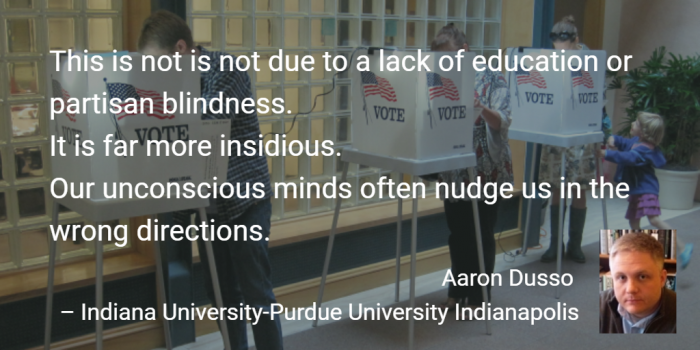Why democracies need open-minded introverts
In a well-functioning democracy, voters connect their own policy preferences to the political party that best represents them. Aaron Dusso’s new book examines how individual psychologies and people’s innate tendencies towards introversion or extroversion affects this ability. He finds that the more extroverted someone is, the less likely they are to successfully match their subjective policy preference with the party that best matches it. Policymakers need to take this into account.

Introvert 6 by Robert via a CC BY 2.0 licence
Democratic forms of government are built on a wholly unrealistic view of human beings’ capabilities. When we argue about fake news, democratic stability, and how ignorant everyone else is, we overlook the enormous assumption upon which democracy is built. The assumption is that citizens can understand the thousands of different public policies modern states produce; know how they work; who implements them; determine how successful they are; identify their strengths and shortcomings; know what actions their representatives took to support or oppose these policies prior to their implementation; and then vote in the next election based on this knowledge.
This is an absurd assumption. Nobody can or ever has been able to do this. Yet our institutions are structured and derive their legitimacy based on the presumption that they can. In my new book, I examine this dilemma from the perspective of individual psychology. When citizens fail to live up to the democratic ideal, it does not mean it is their fault; there are numerous variables outside of a person’s control that will determine their likelihood of success in achieving that goal. In my new book, I show that becoming the ideal democratic citizen is no different.
Our personalities are not generally thought to be something we can choose. People cannot wake up and simply decide they are tired of being introverted and will henceforth be extroverted. Change of this sort is not easy and only with considerable effort can deliberate change occur, if at all. Variables like one’s personality, which operates in our unconscious mind (i.e., it affects our behaviour but we don’t control it), influence on how well we understand the political world. While it can be easy to place the blame on individuals for being blindly partisan, if our unconscious minds are pushing us away from democratic competence how we engage with politics is not entirely under our control. If it is not under our control, then the solutions to the many problems democratic societies face fall well beyond better education, reduced political apathy, or a more competent news media.
Extroversion and openness: democracies need open-minded introverts
People who are the most open to new experiences are also really good at performing the basic tasks of democratic citizens. Here I will summarize just one example from chapter four in the book:
To my mind, the most basic request democratic systems make of their populous is that they can connect their own subjective policy preferences to the political party that best represents them. This is as simple as it gets. It does not require people to have accurate understandings of any issue, just that they have an opinion and know the party that supports that opinion. If citizens cannot do this, then the act of voting is meaningless.
The results show that fortunately, most people were able to connect their policy preference to the correct political party. However, there is cause for concern. In some cases, nearly 30% of respondents failed to be able to make this simple connection. It is not just a lack of education, interest in politics, or partisan blindness that causes this mistake. It is far more insidious. Our unconscious minds often nudge us in the wrong directions.

I administered a survey of US citizens who were asked to share their opinion on various issues and which political party was handling the issue best. Questions covered issues such as opinions on same-sex marriage and spending on the US food stamp programme. In both instances, the more extroverted someone is, the more likely they are to fail to make the proper connection between a policy preference and the actions of the two major political parties. The opposite is true for openness. The more open one is, the better the person is at making the connection.
However, the truly important result isn’t just statistical significance. It is the relative size of the effect. In most cases, it is larger than the variables most commonly pointed to by astute political observers like partisanship, political knowledge, ideology, level of education, and one’s religiosity. In the case of same-sex marriage, a closed-minded extrovert is nearly 14% more likely to make this mistake than an open-minded introvert. When it comes to food stamps, closed-minded extroverts are more than 15% more likely to get this wrong than open-minded introverts.
In these two questions, personality plays a bigger role in driving this disconnect than one’s level of education, whether one is a Democratic or Republican, conservative or liberal, religious or not, and even sometimes more important than how politically knowledgeable one is. Yet there are no notable civic reforms that take personality into account. It’s time to start thinking of democratic reforms that are designed with real people in mind.
This post represents the views of the author, and not those of Democratic Audit. It first appeared at the LSE US Centre blog.
 Aaron Dusso is an Associate Professor in the Department of Political Science at Indiana University-Purdue University Indianapolis and a core faculty member of Indiana University’s Center for Civic Literacy. His primary research is on the intersection of political psychology and citizen knowledge and engagement. His previous works have been published in the journals of Electoral Studies, Political Behavior, Political Research Quarterly, and Social Science Quarterly.
Aaron Dusso is an Associate Professor in the Department of Political Science at Indiana University-Purdue University Indianapolis and a core faculty member of Indiana University’s Center for Civic Literacy. His primary research is on the intersection of political psychology and citizen knowledge and engagement. His previous works have been published in the journals of Electoral Studies, Political Behavior, Political Research Quarterly, and Social Science Quarterly.





 Democratic Audit's core funding is provided by the Joseph Rowntree Charitable Trust. Additional funding is provided by the London School of Economics.
Democratic Audit's core funding is provided by the Joseph Rowntree Charitable Trust. Additional funding is provided by the London School of Economics.